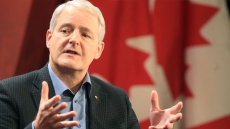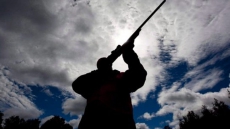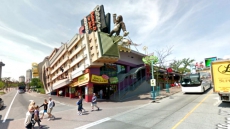EDMONTON — Alberta Premier Rachel Notley is getting high marks for leadership in handling the Fort McMurray wildfire crisis, but political observers say the disaster remains a dicey political proposition with limited upside and a lot of downside.
Political scientist Duane Bratt says the process of getting people back into their homes and getting aid and reconstruction money will tell the tale on how Notley will be remembered in the long term for her handling of the crisis.
"On the political side … if you handle it well, it's a short term blip," said Bratt, a political scientist with Mount Royal University in Calgary. "If you screw it up, it never goes away."
About 80,000 evacuees are to return on June 1 to Fort McMurray, almost a month after a raging blaze broke through the firelines and destroyed 2,400 structures, most of them houses.
Since then Notley has become the face and focus of efforts to contain the blaze, save the city, and get it back on its feet.
She has given almost daily updates for three weeks.
It's been an organizational challenge orchestrated on the fly on multiple tracks: getting the evacuees out and fire crews in, securing the area from looting, and finding temporary homes for the displaced in Lac la Biche, Edmonton and beyond.

Preloaded debit cards were being handed out a week after the evacuation.
Notley met with oilsands officials to consult and calm concerns about production. She toured the city twice, once with Prime Minister Justin Trudeau and afterward received Trudeau's pledge to expand employment insurance coverage.
There was benefit to be derived from the past experiences of major disasters in the province — a wildfire that destroyed a third of Slave Lake in 2011 and massive flooding that displaced thousands in Calgary and southern Alberta in 2013.
"She's handled this as well as can be expected," said Bratt. "Had any of that had gone wrong she would've taken the blame, so she gets the credit here as well."
Bratt said the evacuation itself was a masterstroke, with more than 80,000 people successfully getting out on the one north-south road out of the city.
Notley has also been credited for her work with her political rival, Opposition Leader Brian Jean of the Wildrose party. Jean, who represents Fort McMurray in the legislature member, saw his own home destroyed in the fire.

Both Bratt and Calgary-based pollster Janet Brown agree Jean has done an admirable job, pushing Notley and her government on their fire-fighting and reconstruction efforts and on personifying the impact of the disaster.
"For those Albertans that actually don't know anyone in Fort Mac, they know Brian Jean and they know his story," said Brown.
"He wouldn't take a room in a refugee centre and he wouldn't take a hotel room. Through it all, he's still putting his constituents first."
Both Notley and Jean have been credited for working together in the crisis, but Brown said that will inevitably change as the crisis moves into reimbursement, insurance and rebuilding.
"As difficult as this situation has been, there haven't been a lot of hard choices," said Brown. "You just do what needs to be done.
"As we get further and further along, the choices will get harder. It will be harder to please everybody. It will be harder to know exactly what the right thing to do is."

Bratt agreed, saying if evacuees remain out of their homes for extended periods or if aid money doesn't arrive in timely fashion, opinions will change.
There's also the final financial tally for a province that is already running more than $10 billion in deficit this year.
"The longer this drags out, the more things get complicated," said Bratt.



